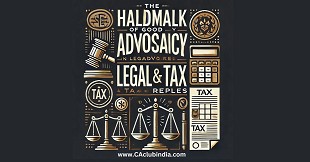Articles by Abhishek Raja
Brevity: The Hallmark of Good Advocacy in Legal and Tax Replies
Abhishek Raja 24 October 2024 at 08:29In the complex world of legal and tax proceedings, the ability to communicate effectively is paramount. The adage "brevity is the hallmark of good advocacy" underscores the importance of conciseness in crafting replies to notices and appeals.
Persuasive Value in Judicial Decisions
Abhishek Raja 26 September 2024 at 08:33In the legal world, judicial decisions carry varying levels of influence, depending on whether they are considered authoritative or persuasive.
Section 122 of CGST Act: Misuse by Authorities and Judicial Relief for Assessees
Abhishek Raja 21 August 2024 at 07:12This section is used, or I must say misused, in most of the Notices! The department is trying to levy a penalty under this section in most cases, but the High Court's views are in favour of the Assessee.
7 Years of GST: My Experience
Abhishek Raja 02 July 2024 at 08:45Reflecting on my seven years of experience with the Goods and Services Tax (GST), I've observed that the GST department frequently imposes its interpretations under the guise of the "intention of the legislature."
Kerala High Court: Favorable ITC Conditions and Retrospective Benefits u/s 16(4)
Abhishek Raja 08 June 2024 at 08:47Kerala High Court: Conditions for ITC U/s 16(2)(c) not in favour of Business; Relief as per Cir. 183 & 193 allowed. Timelines for Sec. 16(4) is procedural and the benefit should be retrospective.
Condonation of Delay in Indian GST: An Analytical Insight
Abhishek Raja 04 June 2024 at 08:34This article delves into the legal landscape surrounding the condonation of delay in GST appeals, analyzing pertinent case laws and providing a comprehensive technical discussion on the matter.
Illness: A Genuine Cause for Relief in Indian GST
Abhishek Raja 29 May 2024 at 08:44This article explores the judicial wisdom and statutory provisions that address this issue. We will delve into specific cases where courts have provided relief due to illness and analyze the constitutional aspects that may be applicable.
Different Grounds in Show Cause Notice and Order in Indian Indirect Tax and GST Law
Abhishek Raja 24 May 2024 at 08:44A Show Cause Notice (SCN) is a preliminary document issued by tax authorities to a taxpayer when there is an alleged non-compliance or violation of tax laws.
Income Tax India's AIS Upgrade: A Closer Look at New Functionalities
Abhishek Raja 16 May 2024 at 08:38The Income Tax Department has now upgraded the AIS functionality, allowing taxpayers to track the confirmation status of information reported by sources like banks. This new feature aims to increase transparency by displaying if the source has accepted or rejected feedback on incorrect data in the AIS.
The Conundrum of Rule 86B in Indian GST Laws!
Abhishek Raja 14 May 2024 at 08:33The Goods and Services Tax (GST) in India has been a subject of continuous evolution since its implementation. One such aspect that has been a cause for concern among taxpayers is the compliance with Rule 86B.
Popular Articles
- RCM on Rent for Family-Owned Properties: Impact of Notification No. 09/2024
- Revision TDS Return Online: Process and Advantages
- Resolving Gaps Between GSTR-2B and GSTR-3B Data
- GST Amnesty Scheme 2024: Sec 128A of CGST Act 2017
- Updates Related To Revamp of IT Act 1961
- Understanding the New IMS (Invoice Management System) on GST Portal
- CBDT's Revised Condonation Timeline: A Chartered Accountant's Perspective
- Choosing the Best Tax Regime for an Annual Income of Rs 10 Lakh: New vs Old














 CAclubindia
CAclubindia

